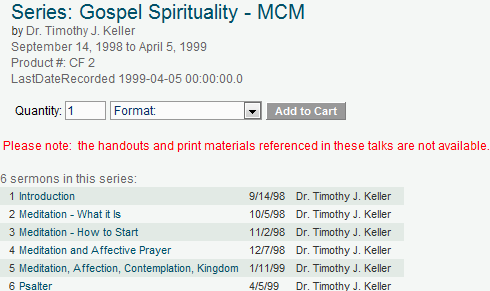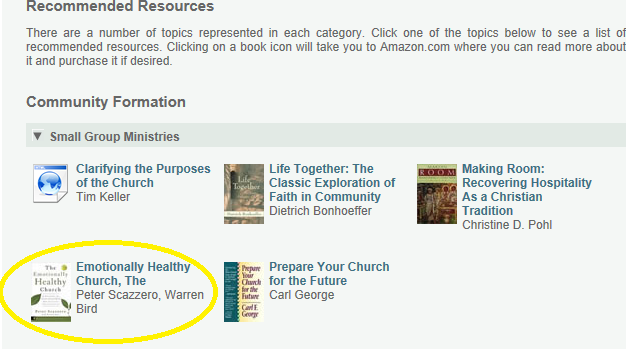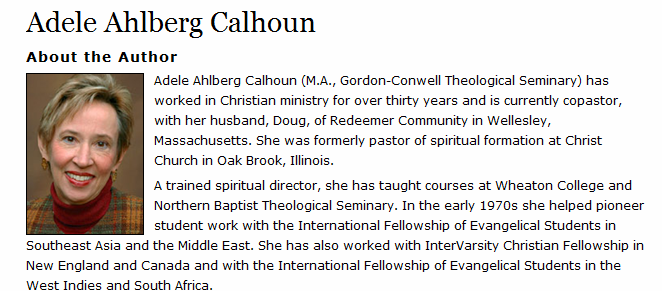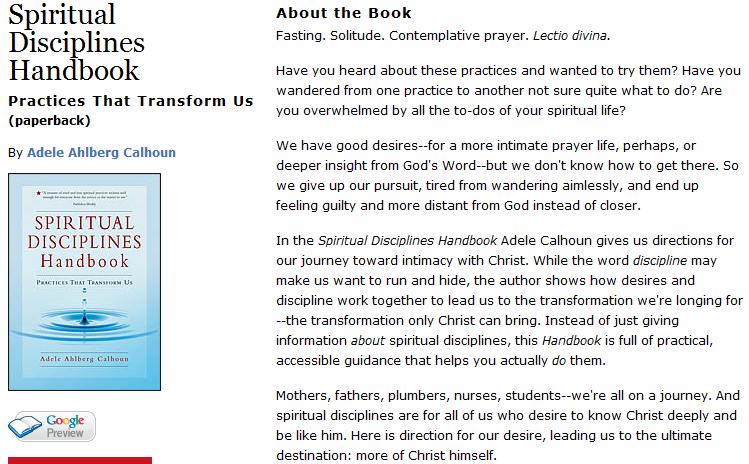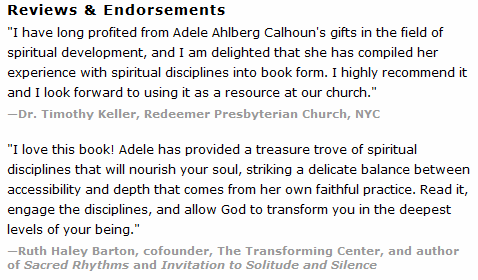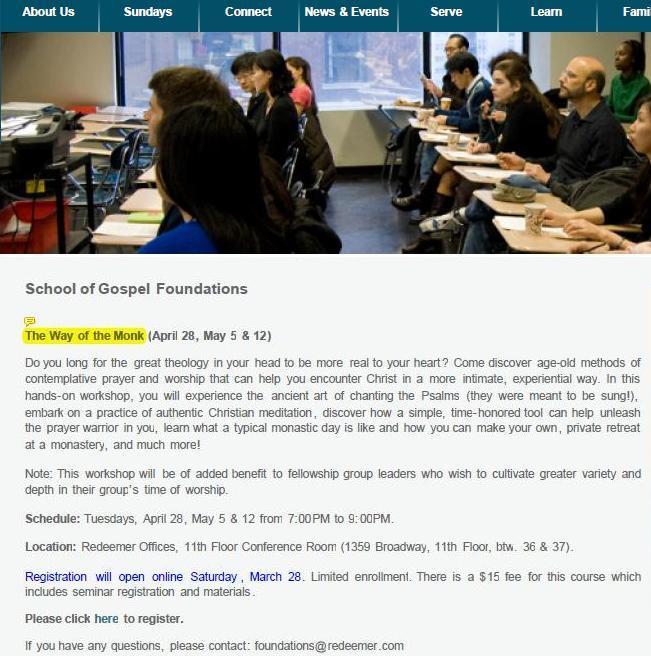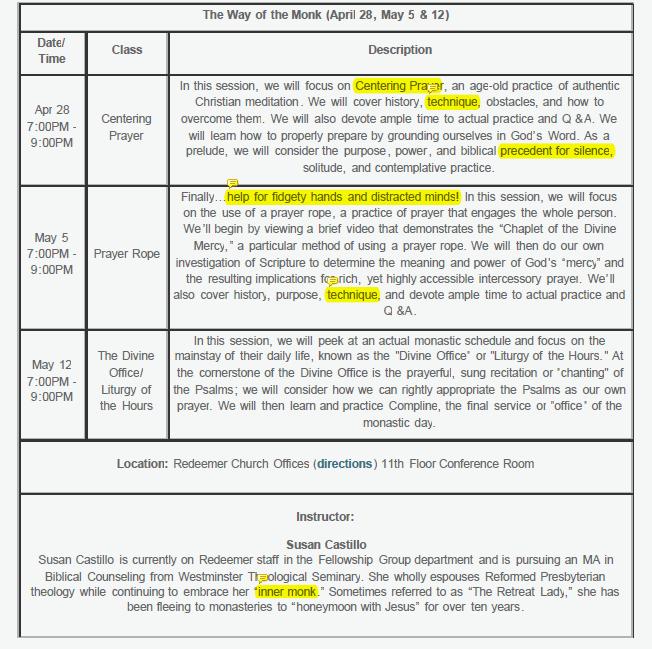TIM KELLER AND CONTEMPLATIVE SPIRITUALITY
By Ken Silva pastor-teacher on Sep 15, 2011 in AM Missives, Contemplative Spirituality/Mysticism, Current Issues, Features
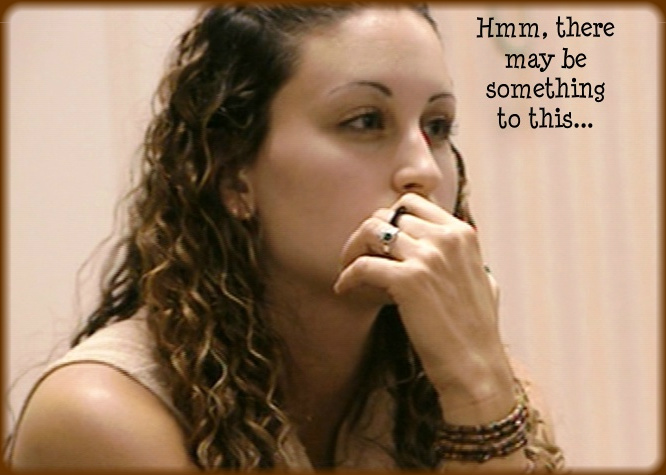 Apprising Ministries continues documenting the growing influence of Contemplative Spirituality/Mysticism(CSM) right into the timid heart of the squishy evanjellyfish pretending to be Protestant community.
Apprising Ministries continues documenting the growing influence of Contemplative Spirituality/Mysticism(CSM) right into the timid heart of the squishy evanjellyfish pretending to be Protestant community.
I’ve told you that the main catalyst for this spiritual skubalon is the Living Spiritual Teacher and Quaker mystic Richard Foster along with his spiritual twin, Southern Baptist minister Dallas Willard; both of whom teach the same spurious spirituality, which they’ve been pawning off for years as so-called Spiritual Formation.
Sadly, it’s metastasizing throughout the church visible now and people who recommend and/or teach it are even being revealed to be in the Reformed sectors, including the so-called young, restless, and reformed crowd. This is the proper backdrop upon which to view the following documentation.
Now I bring you this follow up to Contemplative Spirituality And Tim Keller. What I’ll show below, apart from adding background information, I will present with minimal comment so as to not distract from the evidence itself. First, Dr. Keller himself has taught and encouraged Roman Catholic mysticism.
By the date in the capture below, you’ll see he did so to, at least, the leadership of his Redeemer Presbyterian Church (RPC) as early as September 14, 1998. The following comes from a series called Gospel Spirituality-MCM:
As you can also see in Meditation What it is? , “This talk was given during a leadership training session at Redeemer Presbyterian Church in New York City” October 5, 1998:
Dr. Keller tells us he’s talking about “levels of prayer,” by which he means “going far deeper into the presence and the reality of God.” Then sounding a bit Gnostic to me he explains that, “The reason that [meditation] is so critically important is because it is the gateway to prayer—to real prayer. To prayer that gets beneath the surface.”
So, you’ll see we’re not talking about Biblical meditation here. Dr. Keller then tells us where he derived some of his views:
we’ve got at least two other streams of that are filled with good, helpful material on meditation – the Catholic stream and the Quaker stream that are not primarily based on meditating on the Scripture. There are a number of reasons why.
But just to give you an example, I read a book by a Quaker—ah actually the book is great, except for one part. Some of you have heard of him. His name is Richard Foster. He wrote the book called Celebration of Discipline. (23:27-23:57)
Dr. Keller also tells us that Foster has written another “book called Meditative Prayer and it’s very typical of the Quaker tradition.” He then shares, “The best things that have been written almost are by Catholics during the counter Reformation—Ignatius Loyola, Francis de Sales, John of the Cross, St. Teresa of Avila—great stuff.”
He then continues on:
Meditation is sensing with the mind instead of just thinking. Here’s what I mean – if I read a passage and I say, ‘that means that, that means that, that means that,’ I’m thinking. But if I read a passage and I say, ‘that’s sweet’ or ‘that hurts’ or ‘that’s beautiful.’ What am I doing? I’m using sensory language.
I’m talking about seeing even though I’m not seeing anything. I’m talking about hearing. I’m talking about tasting. In other words, by letting your heart sense the truths rather than simply understanding them you’ve begun to meditate.
Meditation is to bring the truth in contact with the heart until the Triune God becomes so real to you that you seek Him with all your being. (32:44-33:28)
Leaving this unbiblical meditation, we note that under Community Formation in their Small Group Ministries at RPC’s website one of the “Recommended Resources” is The Emotionally Healthy Church (EMC) by a leading teacher of CSM, Peter Scazzero:
Dr. Keller then tells us in his endorsement within EMC itself:
In EMC, which even comes with an endorsement on its back cover by NAR and IHOP spiritual wingnut Mike Bickle, Scazzero recommends the Christian be Faithful to Your True Self as he asks a couple of questions:
Does how I am living my life fit with my God-given nature? Does it fit my true self (to use Thomas Merton’s terminology in his Seeds of Contemplation)? [1]
The book Scazzero references from the late Roman Catholic mystic monk Thomas Merton is decidedly anti-sola Scriptura and is actually an ode to the highly subjective experience of Contemplative/Centering Prayer (CCP), which itself is a transcendental meditation-lite in an altered state of consciousness.
For more on Peter Scazzero, who also has Jacqueline Snape as his Elder-In-Residence on staff—though her original title was Assistant Executive Pastrix—I refer you to Peter Scazzero Bringing Rome Home To His Church. The fact remains, there are no qualifications for women elders.
Which now brings me to InterVarsityPress (IVP) author—and pastrix—Adele Calhoun, who is “co-minister” at Redeemer Community Church along with her husband Doug:
Pastrix Calhoun happens to be the author of something which is called Spiritual Disciplines Handbook: Practices That Transform Us (SDH):
You’ll want to know that SDH is part of the fetid Formatio line at IVP, which itself is absolutely chock full of CSM skubalon; and note that we’re told above SDH will teach us, “Fasting. Solitude. Contemplative prayer. Lectio divina.” My guess would be this is what prompted What’s Happening to InterVarsity?
In that piece, which ran a while back in the e-journal of 9 Marks, former staff worker at IVP J. Mack Stiles shared his concerns about IVP’s drift into CSM. Now note Dr. Tim Keller is the first with an endorsement for SDH right above Ruth Haley Barton, another leading teacher of spurious CSM:
As a former Roman Catholic I do sincerely wonder just what “profited” Dr. Keller from the “experience” of Adele Calhoun, as I said, a pastrix in violation of God’s Word, that he would wish to so “highly recommend” SDH and “look forward to using it as a resource at” his RPC.
From my personal copy, I’ll tell you right on the back cover of her SDH Calhoun informs us this handbook of heterodox (at best) practices features “how to” info on CCP and Lectio Divina. In SDH I’m taught how to supposedly “open myself to God” through the Examen of Counter Reformation figure Ignatius of Loyola.
If you don’t know, he’s the founder of the militantly pro-Roman Catholic Church spiritual Gestapo Unit aka the Jesuits; who weren’t really fond of the Protestant Reformers. These “spiritual disciplines” were actually developed and practiced in the monastic traditions of the Roman Catholic Church.
You need to remember that it only ended up placing its anathema upon the very Gospel of Jesus Christ itself. The question them becomes, why would I need to go to apostate Roman Catholics to learn how to grow closer to Christ; Whose Gospel they cursed, and His children their popes had murdered?
We’re also told in Calhoun’s SDH that we will learn the ways we can “reliquish the false self” through mantric meditation ala Roman Catholic mystic John Main (1926-1982), which actually originated in pagan Eastern religions:
Go into silence, placing yourself in the presence of God with the words “Here I am.” As distractions come to mind, let them go by imagining they are boats floating down a river.
Let the current take the distractions away. Don’t follow the distractions. Gently return to God repeating “Here I am.” Let the current of God’s Spirit carry you. What is this like for you? [2]
Indeed, one of the “Resources on Silence” Calhoun recommends in SDH is another book on CCP by aforementioned CSM guru Ruth Haley Barton, trained at the infamous Shalem Institute. In fact, the list of pastrix Calhoun’s acknowledgements in SDH is itself a veritable who’s who of spurious spirituality.
These include Ignatius of Loyola, Dallas Willard, and Richard Foster; as well as Phyllis Tickle, Richard Rohr, Teresa of Avila “and many more.” Calhoun then informs us that, “Their ideas, voices and examples have shaped my own words and experiences of the disciplines.” [3] That’s a mighty sad roll call indeed.
Finally, there’s something called The Way of the Monk that was taught at RPC over three sessions from April 28, May 5 & 12, 2009 by then staff member Susan Castillo whom you can see below wholly espouses Reformed Presbyterian theology while continuing to embrace her inner monk:
The question I have to ask as a former prisoner of the religious bondage of apostate Roman Catholicism, is why would RPC even want to expose their flock to the Counter Reformation spirituality of The Way of the Monk (TWM), which is the opposite of the Reformed principle of sola Scriptura:
Do you long for the great theology in your head to be more real to your heart? Come discover age-old methods of contemplative prayer and worship that can help you encounter Christ in a more intimate, experiential way.
In this hands-on workshop, you will experience the ancient art of chanting the Psalms (they were meant to be sung!), embark on a practice of authentic Christian meditation, discover how a simple, time-honored tool can help unleash the prayer warrior in you, learn what a typical monastic day is like and how you can make your own, private retreat at a monastery, and much more! (Online source, emphasis mine)
If you click the above links concerning TWM you’ll see that this has all since vanished from the RPC website, which itself is a bit odd. We’re not exactly sure where Castillo got the TWM curriculum from but it may have involved Seeking God: The Way Of The Monk DVD, which was produced as an:
examination of the strange life of the Benedictine monks at New Mexico’s Monastery of Christ in the Desert, presents the traditional chants, seasonal rituals,… (Online source)
What is clear from the capture above is that TWM involved practices of contemplative spirituality.
________________________________________________________________________________
End notes:
Back to note 1 — Peter Scazzero, The Emotionally Healthy Church [Grand Rapids: Zondervan, 2003], 144.
Back to note 2 — Adele Calhoun, Spiritual Disciplines Handbook: Practices That Transform Us, [Downers Grove: InterVarsityPress, 2005], 110.
Back to note 3 — Ibid., 10.
See also:
JOHN PIPER, RICK WARREN & FOSTER-WILLARDISM
MARK DRISCOLL AND NEO-REFORMED NEW CALVINIST CONTEMPLATIVE SPIRITUALITY
MATT CHANDLER AND CURIOUS DECISIONS
‘DISCIPLINES OF THE SOUL’ FROM ERWIN LUTZER
DONALD WHITNEY, MYSTICISM, AND SPIRITUALITY WITHOUT BOUNDARIES
“CELEBRATION OF DISCIPLINE” BY RICHARD FOSTER AN ENCYCLOPEDIA OF THEOLOGICAL ERROR
RICHARD FOSTER: THE BIBLE A RELIABLE GUIDE DESPITE INCONSISTENCIES
